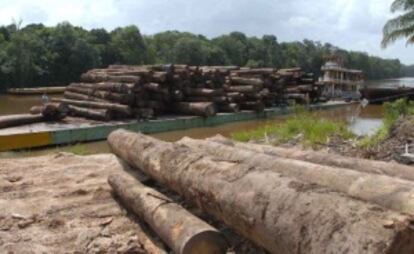Latin America: the world’s deadliest spot for environmental activists
Close to 90 of the 116 murders of land defenders that took place in 2014 occurred in region

Raimundo Rodrigues da Silva was a Brazilian rural worker who had dedicated his life to fighting to protect the land where he lived.
On February 21, 2014, the 42-year-old died from a shotgun wound in Campestre, a rural area around 280 kilometers from São Luis, the capital of Brazil’s northeastern Maranhão state.
According to an investigative commission, Rodrigues da Silva was on a black list after he reportedly had a confrontation with a powerful landowner who wanted to take over his community.
His death was one of 116 murders of environmental activists that took place last year across the globe, according to a recent report by NGO Global Witness.
With 29 murders reported in 2014, Brazil ranks first in terms of the number of activist killings on the organization’s 17-nation list, followed by Colombia (25 cases), the Philippines (15), Honduras (12), Peru (nine) and Guatemala (five). In total, 87 of the killings took place in Latin America.
Some governments have gone as far as to apply counter-terrorism laws against activists
Global Witness, which investigates corruption and abuses relating to the exploitation of natural resources, called the figures “shocking.”
It also found it “alarming” how some governments have applied counter-terrorism laws to prosecute activists, describing them as “enemies of the state.”
“Killings represent the extreme end of a spectrum of risks faced by environmental and land defenders, including death threats and physical violence, criminalization and restrictions on freedoms,” the report stated. “Many defenders live in remote, poor communities with limited access to communications, the media and avenues to pursue justice, putting them at greater risk.”
In Brazil, where Global Witness said 477 environmental-related murders have taken place since 2002, the majority of the killings are related to ownership, control and use of land as well as illegal mining and logging activities.
More than 5,000 square-kilometers of Amazon jungle are destroyed there each year – one of the highest deforestation rates on the planet.
“In 2014, 47 indigenous people were killed defending their natural resources, 40 percent of the total deaths of environmental and land defenders,” the report said.
According to Global Witness, the majority of murders go unpunished. But in Rodrigues da Silva’s case, a suspect is being held awaiting homicide charges – a rare exception in Brazil, where close to 90 percent of the murders go unsolved.
In August 2013, Spanish biologist Gonzalo Alonso Hernández, an activist who fought for the protection of the Cunhambebe Park in Rio de Janeiro state, was murdered at his home. His killers dumped his body in a waterfall at the park.
For years, Alonso fought those who tried to burn and destroy green areas to make way for cattle grazing grounds.
“He never had any bad enemies like those he denounced for their activities against the environment,” his wife María Lourdes Pena told EL PAÍS.
After two years, no one has been brought to justice for his murder, Pena said.
“The Brazilian press didn’t give any importance to this case and if it doesn’t appear in the media, no one cares. But I am still hopeful because there is no such thing as a perfect crime.”
Tu suscripción se está usando en otro dispositivo
¿Quieres añadir otro usuario a tu suscripción?
Si continúas leyendo en este dispositivo, no se podrá leer en el otro.
FlechaTu suscripción se está usando en otro dispositivo y solo puedes acceder a EL PAÍS desde un dispositivo a la vez.
Si quieres compartir tu cuenta, cambia tu suscripción a la modalidad Premium, así podrás añadir otro usuario. Cada uno accederá con su propia cuenta de email, lo que os permitirá personalizar vuestra experiencia en EL PAÍS.
¿Tienes una suscripción de empresa? Accede aquí para contratar más cuentas.
En el caso de no saber quién está usando tu cuenta, te recomendamos cambiar tu contraseña aquí.
Si decides continuar compartiendo tu cuenta, este mensaje se mostrará en tu dispositivo y en el de la otra persona que está usando tu cuenta de forma indefinida, afectando a tu experiencia de lectura. Puedes consultar aquí los términos y condiciones de la suscripción digital.









































